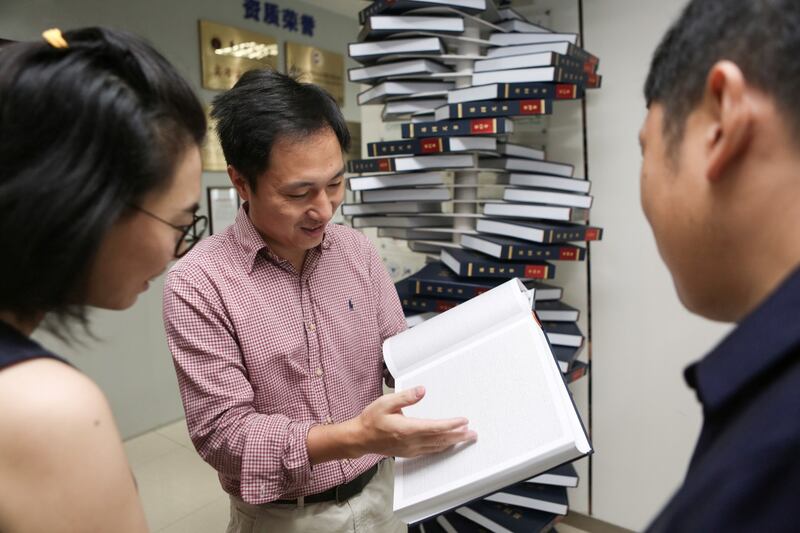UPDATED at 1:50 p.m. EST on 2023-02-21
Hong Kong on Tuesday revoked a visa it granted to a Chinese scientist jailed for three years after claiming to have made the world's first genetically edited babies, reversing course hours after he unveiled plans to do research in the city.
He Jiankui resurfaced in Beijing this week following his release 10 months ago at the end of a three-year jail term for "illegally practicing medicine."
He told reporters in the Chinese capital on Tuesday that he had recently been granted a visa for Hong Kong under the city's Top Talent Pass scheme, a talent recruitment drive that aims to lure highly qualified scientists and other professionals to Hong Kong amid a huge brain drain sparked by the city's ongoing crackdown on dissent.
Hours after He's brief media appearance, however, Hong Kong immigration authorities, without referring to He by name, said they had revoked the controversial scientist's visa and that a criminal investigation would be conducted on the case..
“After the immigration department reviewed the application, it suspected that someone had made false statements to get the visa approval,” the statement said. “The director of immigration has declared that the visa is invalid in accordance with the law.”
Authorities in the southern province of Guangdong began an investigation into the activities of the geneticist and Stanford University graduate after he claimed at a biomedical conference in Hong Kong in November 2018 to have edited the genes of twin babies to confer immunity to HIV. He was convicted and jailed in 2019.

He told the 2018 conference that the twins' DNA was modified using CRISPR, a technique which allows scientists to remove and replace a strand of genetic material with pinpoint precision. He was investigated by Guangdong police after the conference ended, state media reported at the time.
He said on Tuesday that he wants to continue his current line of research developing gene therapies for rare genetic diseases.
"I am currently in contact with university research institutes and companies in Hong Kong, and I will consider going there if a suitable opportunity arises," he said.
"My scientific research will comply with the ethics codes and international consensus on scientific research," he told a brief news conference in Beijing, adding that he wants to research Duchenne Muscular Dystrophy, a genetic disorder that often causes people to die of heart and lung failure when they are about 20 years old.
"I have always believed that Hong Kong is a free, prosperous, inclusive, and open city," He said, adding a phrase that has been repeated many times by officials seeking to reboot the city's fortunes after the imposition of a draconian national security law and the economic stagnation brought by pandemic control measures: "I am optimistic about the future of Hong Kong."
Asked if he had submitted details of his criminal record during the application process, He left without answering.
He's work using controversial CRISPR technology was criticized by international scientists in 2018 for being irresponsible and medically unnecessary, yet details of his work appeared in the People's Daily, the official mouthpiece of the ruling Chinese Communist Party.
He had been scheduled to speak at the University of Oxford next month, but announced via his Twitter account that he wasn't ready to talk about his experiences over the past three years, and had canceled the engagement, the Associated Press reported.
Hong Kong secretary for labor and welfare Chris Sun declined to comment on individual cases, but said applications containing false statements were invalid. But he confirmed that there is currently no requirement to declare criminal records as part of the Top Talent Pass application process.
"We may make adjustments to the scheme from time to time," he said.
Competing for talent
Hong Kong current affairs commentator To Yiu-ming said there are concerns that Hong Kong could turn into a refuge for mainland Chinese with criminal records under the talent scheme.
"People who commit crimes in mainland China have trouble carrying on with their lives afterwards," To said. "Hong Kong could provide an option for this group, and could attract more people like this to come to Hong Kong if the loophole isn't closed."
A similar talent visa scheme offered by Singapore does require applicants to declare any criminal convictions. Similar rules are in place as part of visa applications in many other countries too, including Canada.
Hong Kong’s own Top Talent Pass government web page also mentions a lack of "known serious criminal convictions" as part of the criteria for approval.
Hong Kong's trawl for regional talent comes after media backed by the ruling party called for schemes to balance out the exodus of highly trained professionals, who have been leaving Hong Kong in droves in recent years, prompting concerns of a brain drain affecting major companies, education and healthcare.
Translated by Luisetta Mudie.
This story has been updated with Hong Kong's decision to revoke He Jiankui's visa.
